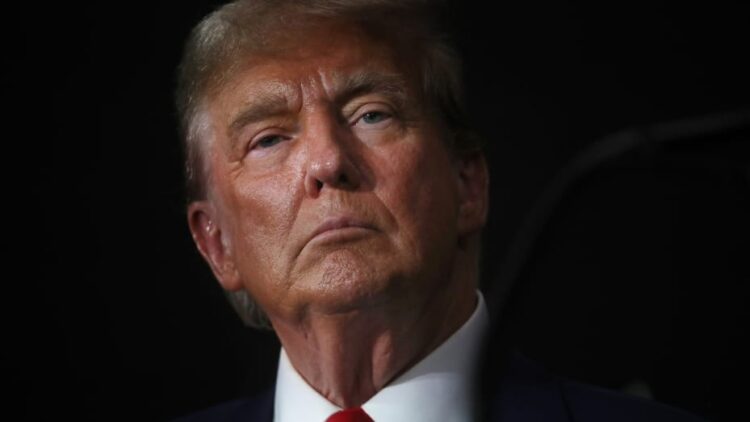By Aaron Miller-
Selection for President Donald Trump’s hush money trial in New York entered has been completed after four days marked by challenges and controversies.
The jury selection process proved arduous due to the polarizing nature of the defendant, with prospective jurors subjected to intense scrutiny regarding their political affiliations, social media activity, and other aspects of their lives.
Concerns over juror anonymity surfaced when one individual feared her identity had been compromised, leading to her eventual excusal from the proceedings.
Two jurors previously selected were excused by the court after an oncology nurse’s identity was pieced together by family and friends from publicly reported details, and another man was connected to an arrest for ripping down rightwing posters in the 1990s.
In response, Judge Juan Merchan ruled to safeguard certain identifying details of jurors, such as their place of employment, from public disclosure.
Throughout the trial, Trump has been present in court, largely impassive, while his Truth Social media account remained active, drawing criticism from prosecutors who alleged violations of a gag order.
A hearing to address these allegations is scheduled for April 23.
Like any criminal defendant, Trump must be present in the Lower Manhattan courtroom throughout the six-week trial.
Leaving the courthouse on Thursday he complained that the proceedings were preventing him from hitting the campaign trail.
“I’m supposed to be in New Hampshire. I’m supposed to be in Georgia. I’m supposed to be in North Carolina, South Carolina,” Trump told reporters.
The 77-year-old clutched a stack of papers handed to him by an aide that he said were printouts of numerous news articles criticising the indictment, which he once again decried as a “hoax”.
The case revolves around a $130,000 payment made by Trump’s former lawyer, Michael Cohen, to adult film actress Stormy Daniels during the 2016 election campaign, purportedly to silence her claims of an affair with Trump.
Prosecutors assert that Trump falsified internal records to conceal the nature of these payments, with Cohen poised to testify as a key witness for the prosecution.
Trump has consistently denied the alleged affair, maintaining that the payments to Cohen constituted legitimate legal expenses.
Facing 34 felony counts of falsifying business records, Trump’s trial marks a historic moment as the first criminal trial of a former US president in an American courtroom.
Concurrently, other legal issues concerning Trump’s conduct during the January 6 insurrection, the handling of classified documents at his Mar-a-Lago estate, and attempts to influence the 2020 election in Georgia are unfolding. Despite attempts by Trump’s legal team to delay these cases, the hush money trial proceeds.
Amidst these legal challenges, Trump maintains a strong foothold in the political arena, poised to secure the Republican nomination for president and potentially face off against incumbent Joe Biden in the upcoming November election.
Recent polling suggests a tight race between Trump and Biden, particularly in key swing states crucial for securing victory in the presidential race.
saw ongoing challenges in jury selection, with the day concluding after the selection of 12 jurors and one alternate.
However, the process faced setbacks as two jurors previously confirmed were excused over concerns regarding anonymity and impartiality.
The trial, brought against Trump by Manhattan District Attorney Alvin Bragg, centers on 34 counts of falsifying business records related to a payment made to porn star Stormy Daniels in the lead-up to the 2016 election, allegedly to silence her about an alleged affair. Trump has pleaded not guilty to all charges.
The day commenced with hurdles as juror number two expressed fears that personal details provided in her jury questionnaire might lead to her identification, potentially affecting her impartiality. Following this, juror number four’s late arrival to court raised concerns about the accuracy of his previous answers during questioning.
Judge Juan Merchan, while optimistic about concluding jury selection by the week’s end with opening statements slated for Monday, faced uncertainties during the morning session. However, the pace accelerated in the afternoon, ultimately resulting in a full jury panel.
Despite the progress, the trial still requires five additional alternates, for which another panel of 96 potential jurors has been sworn in for the upcoming session.
Trump’s discomfort with the trial was evident as he labelled the proceedings “a mess,” reflecting his discontent with the situation. Throughout the trial, Trump’s supporters have remained vocal, with discussions arising about the implications of the case on the Republican Party.
Outside the courtroom, Trump’s interactions have garnered attention, including a visit to a bodega and his complaints about the courtroom’s temperature. His demeanor indicates his dissatisfaction with the trial’s proceedings.
As the trial progresses, it is anticipated that Trump will face rigorous questioning about allegations of sexual abuse and fraud should he choose to testify, as emphasized by Manhattan prosecutors.
The challenges in jury selection underscore the difficulty of finding impartial jurors in a city known for its highly opinionated populace. The excusal of two jurors further complicates an already complex process.




